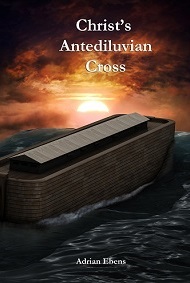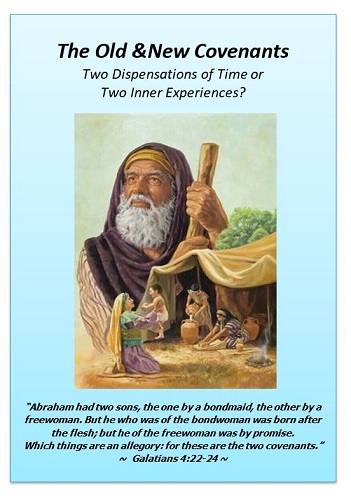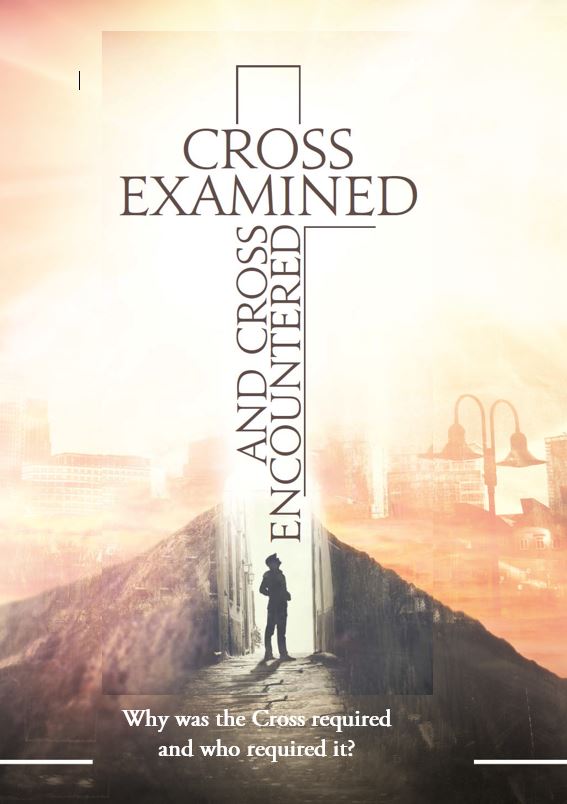One fountain-head of Divinity = One God, not two, or three.
Probably my single favorite EGW quotation is the following from "The Desire of Ages."
But turning from all lesser representations, we behold God in Jesus. Looking unto Jesus we see that it is the glory of our God to give. "I do nothing of Myself," said Christ; "the living Father hath sent Me, and I live by the Father." "I seek not Mine own glory," but the glory of Him that sent Me. John 8:28; 6:57; 8:50; 7:18. In these words is set forth the great principle which is the law of life for the universe. All things Christ received from God, but He took to give. So in the heavenly courts, in His ministry for all created beings: through the beloved Son, the Father's life flows out to all; through the Son it returns, in praise and joyous service, a tide of love, to the great Source of all. And thus through Christ the circuit of beneficence is complete, representing the character of the great Giver, the law of life. {DA 21.2}
To me, this quotation was like a summary of the Father/Son relationship, and a confession of monotheism in contrast with all versions of polytheism. This same quotation was the great rational of why there is only ONE SUPREME BEING IN THE UNIVERSE. Recently I have been curious if these words (or concepts) were borrowed from another Protestant author. After doing a handful of google searches over the past year or so, I gave up. Then, while reading a book by Novatian "On the Trinity" I stumbled upon the following quotation which was strangely familiar.
"In dealing with this subject, inasmuch as He is the only begotten and the first begotten, of Him, Who, as having no origin, is alone the beginning and the fountain-head of all things, He thereby declared that God is One; Whom He has evinced to be not in subjection to any beginning or source of being, but rather Himself the source of being, and the beginning of all things. It is accordingly, part of the same truth, that He does nothing of His Own will, and makes nothing of His Own counsel, and comes not from Himself, but obeys every command and injunction of the Father....The subjection of all things to Him, as Son, by the Father, and the subjection of Himself, together with everything that has been put in subjection to Him, to His Father, prove that He is the Son of His Father; as to all else, we find Him to be both their Lord and their God. Hence all things are placed under His feet, and delivered to Him who is God, and the Son acknowledges that all things are in subjection to Him as a gift from the Father; thus He refers back to the Father the entire authority of Godhead. The Father is shown to be the One God, true and eternal; from Him alone this power of Divinity issues, and though it is transmitted to the Son and centered upon Him, it runs its course back to the Father, through their community of Substance. The Son is shown to be God, since Divinity is manifestly delivered and granted to Him; yet none the less, the Father is proved to be the One God, while step by step that same Majesty and Divinity, like a billow returning upon itself, sent forth again from the Son Himself, returns and finds its way back to the Father Who gave it. Thus we see that the Father is the God of all things, and also the source of the being of His Son, Whom He has begotten as Lord; and the Son is the God of all else, since the Father has appointed Him Whom He begat to be over all things." (The treatise of Novatian On the Trinity, By Novatianus, translated by Herbert Moore, 1919.)
While some might argue that the words and phrases from the "Desire of Ages" quotation are different, few can argue that upon close examination, the parallel concepts are virtually identical. Some might quickly point out that Herbert Moore translated (from Latin), and published the Novatian book in 1919, twenty some years AFTER D.A. was published. Yet, the Novatian treaty "On the Trinity" was published as early as 1520, and translated into English at least by 1869. It should be noted that Moore's translation is slightly more paraphrased, while the 1869 version is a more literal, and exact translation.
The significance of the Novation book about the Trinity is at least twofold. Firstly, it is the oldest surviving commentary specifically about the Trinity from any Christian author. Secondly, Novation's interpretation of scriptures related to the Godhead are amazingly similar to the early SDA's.
Novatianus wrote his work about 257 a.d., some 68 years BEFORE the Nicene council, and the controversy between Athanasius and Arius. The irony is that some have applauded Novatianus as defending "the orthodox doctrine of the Trinity against contemporary heresies", while others have criticized him of virtually teaching semi-arianism. Sound familiar? After a superficial reading of his book, it appears that the Christology of Novatianus is practically identical with the early SDA pioneers. For any interested in this subject, his short work is well worth the read; especially considering his interpretation of many, many, Bible texts upon the subject (both translations are worth the read).
It should be noted that modern SDA promoters of Trinitarianism, (i.e. Max Hatton), have harshly criticized the early SDA position as having "two gods" which is a miniature form of polytheism in comparison to tritheism. One of the main arguments of the entire Novatian book was to refute the accusation by the Sabbellians (modalists) of his day, that Christians believed in "two Gods." Novatian's arguments of WHY Christians don't believe in two Gods are undoubtedly the most articulate I have ever read. His many references to the Son being "born" and "begotten" are not referring to the incarnation at Bethlehem as you will see. I will close now and leave you with the final chapter from Novatian's commentary "On the Trinity."
CHAPTER XXXI
CONCLUSION
The Eternal Relationship of the Son to the Father
There is, then, God the Father, Who established and created all things, Who alone is without origin, invisible, boundless, immortal, eternal, the One God. To His greatness, His majesty, His powers alike, nothing whatever can be placed, I will not say in superiority, but even in comparison. From Him, at such a time as He, the Father, willed, the Word, Who is the Son, was born; the Word, understood not in the sense of a sound striking upon the air, or the resonance of the voice forced from the lungs, but acknowledged as the Personal Substance of a power issuing forth from God. As to the secrets of this sacred and divine nativity, no apostle has taught them, no prophet has discovered them, no angel has ascertained them, no creature has known them; they are known to the Son alone, Who has knowledge of the secret things of the Father.
The Son has His Origin in the Father, Who has no Origin The Son, then, since He is begotten of the Father, is always in the Father. When I say "always," I do not maintain that He is unborn, but that He is born. Yet He Who is before all time, must be said to have always existed in the Father; for a date in time cannot be fixed for Him Who is before all time. He is eternally in the Father; otherwise the Father were not always Father. At the same time, the Father is antecedent to Him, for the Father must of necessity be before the Son, as Father, inasmuch as He Who knows not an origin must of necessity exist before Him Who has an origin. Of necessity, too, the Son must be less than the Father, for He knows Himself to be in the Father; He has an origin, in that He is born, and through the Father, in some mysterious manner, although He has an origin, as born, He is germane to Him, in the matter of His birth, seeing that He is born of the Father, Who alone has no origin. He, then, at such time as the Father willed, proceeded from the Father; and He Who was in the Father, because He was of the Father, was thereafter with the Father, because He proceeded from the Father, being none other than the Divine Personal Substance, Whose name is the Word, through Whom all things were made, and without Whom nothing was made. For all things are after Him, since they are through Him, and of course He is before all things (but after the Father), seeing that all things were made through Him. He proceeded from the Father, at Whose will all things were made, God, assuredly, proceeding from God, constituting the Second Person after the Father, as Son, yet not robbing the Father of the unity of the Godhead.
As the Son is born of the Father, there cannot be two Gods
For, if He had not been born, as unborn He would have been brought into comparison with Him Who is unborn; then Both would have been shown to be on the same level, and so He would make two Unborn, and therefore, two Gods. If He had not been begotten, He would have been ranked with Him Who is not begotten, and the Two, being found to be equal, as unbegotten, would, of course, have given us two Gods, and so Christ would have given us two Gods. If He were like the Father, without an origin, He, too, would prove to be like the Father, the beginning of all things, making two beginnings; with the result that He would have set before us two Gods, as well as two beginnings. Again, if He were not the Son, but the Father, begetting another son from Himself, of course He would have been ranked with the Father, and been declared to be as great as He; then He would have constituted two Fathers, and so would have justified also the idea of two Gods. If He had been invisible, He would have ranked with Him who is invisible, and been declared equal to Him; then He would have set before us two Invisibles, and so have admitted that there are also two Gods. If He had been incomprehensible,1 if He had possessed all the other attributes of the Father, I will go so far as to say that He would have given fair grounds for the theory of two Gods devised by this party in the controversy. But as the matter stands, whatever He is, He is not of Himself; for He is not unborn, but of the Father. He is begotten. For whether He is the Word, whether He is power, whether He is wisdom, whether He is light, whether He is the Son—whatever He is of these, He has no other source of His Being, as we have said before, than the Father. He owes His origin to the Father. He could not then occasion any variance in the Divine Essence, by making two Gods; for He derived His origin, in being born, from Him Who is the one God. In dealing with this subject, inasmuch as He is the only begotten and the first begotten, of Him, Who, as having no origin, is alone the beginning and the fountain-head of all things, He thereby declared that God is One; Whom He has evinced to be not in subjection to any beginning or source of being, but rather Himself the source of being, and the beginning of all things.
His Obedience proves His Sonship
It is accordingly, part of the same truth, that He does nothing of His Own will, and makes nothing of His Own counsel, and comes not from Himself, but obeys every command and injunction of the Father. His birth proves Him to be the Son, yet His devoted obedience declares that He is the minister of the will of the Father, from Whom He has His Being. And so, while He renders due submission to the Father in all things, though He is God as well as minister, yet by His obedience He shows that the Father, from Whom He drew His origin, is One God.
The Birth of the Son from the Father proves the Unity of God
Thus it was impossible for Him to make two Gods, as He did not make two origins, He Who before all time received the beginning of birth from Him Who has no origin. That Which is unborn is the source of being to all else; this Unborn is the One God the Father, Himself beyond origin, from Whom is He Who is born. Now as He Who is born of Him, of course, comes from Him Who has no origin, thus proving that the source of being is He of Whom He Himself is, though He Who has been born is God, yet He declares that God is One, since He Who has been born has established that He is without origin.
The Community of the Divine Substance
God, then, He is, but God begotten unto Godhead. Lord, too, He is, but born of the Father unto Lordship. Angel, too, He is, but Angel sent forth from His Father, to declare the great counsel of God. His Divinity is so transmitted to Him, that He cannot appear to have given us two Gods, either through discord, or through inequality, within the Godhead. The subjection of all things to Him, as Son, by the Father, and the subjection of Himself, together with everything that has been put in subjection to Him, to His Father, prove that He is the Son of His Father; as to all else, we find Him to be both their Lord and their God. Hence all things are placed under His feet, and delivered to Him who is God, and the Son acknowledges that all things are in subjection to Him as a gift from the Father ; thus He refers back to the Father the entire authority of Godhead. The Father is shown to be the One God, true and eternal; from Him alone this power of Divinity issues, and though it is transmitted to the Son and centered upon Him, it runs its course back to the Father, through their community of Substance. The Son is shown to be God, since Divinity is manifestly delivered and granted to Him; yet none the less, the Father is proved to be the One God, while step by step that same Majesty and Divinity, like a billow returning upon itself, sent forth again from the Son Himself, returns and finds its way back to the Father Who gave it. Thus we see that the Father is the God of all things, and also the source of the being of His Son, Whom He has begotten as Lord; and the Son is the God of all else, since the Father has appointed Him Whom He begat to be over all things.
Briefly, then, our conclusion is this: "The Mediator between God and man, Christ Jesus," Who possesses power over the whole creation, which is put in subjection to Him as God by His Own Father, together with the whole creation so put in subjection to Him, found at last to be in perfect harmony with His Father, God, while yet it is eternally true that "he was heard," has proved that there is one true God, and one alone, His Father.
NOTES
Novatian "On the Trinity" 1919 translation
http://books.google.com/books?pg=PA139&dq=novatian+trinity+moore&id=Jek0AQAAIAAJ#v=onepage&q&f=false
Novatian "On the Trinity" 1869 translation
http://christianbookshelf.org/novatian/a_treatise_of_novatian_concerning_the_trinity/index.html
Leroy Froom evidently read Novatian's views on the Trinity, for he dedicated an entire section about him in "Conditionalist Faith of our Fathers." Ironically enough, Froom says Novation was sound in his doctrine, choosing to ignore Novation's blatant "semi-arian" beliefs while apologizing for all the "lunatic fringe" SDA pioneers who believed exactly the same about the pre-incarnate, literal sonship of Christ. Another classic example of Froom's biased, and unreliable historical research.
E. J. Waggoner quotes Novatian in his book entitled "FATHERS OF THE CATHOLIC CHURCH A BRIEF EXAMINATION OF THE "FALLING AWAY" OF THE CHURCH IN THE FIRST THREE CENTURIES, p. 178, 1888.
Novatian and followers highly regarded in Signs of the Times article, June 11, 1894, p. 494. This article specifically mentions Novatians book on the Trinity.
A. G. Daniells mentions that Arius was a Novatian Bishop. (The Abiding Gift of Prophecy, p. 203).





